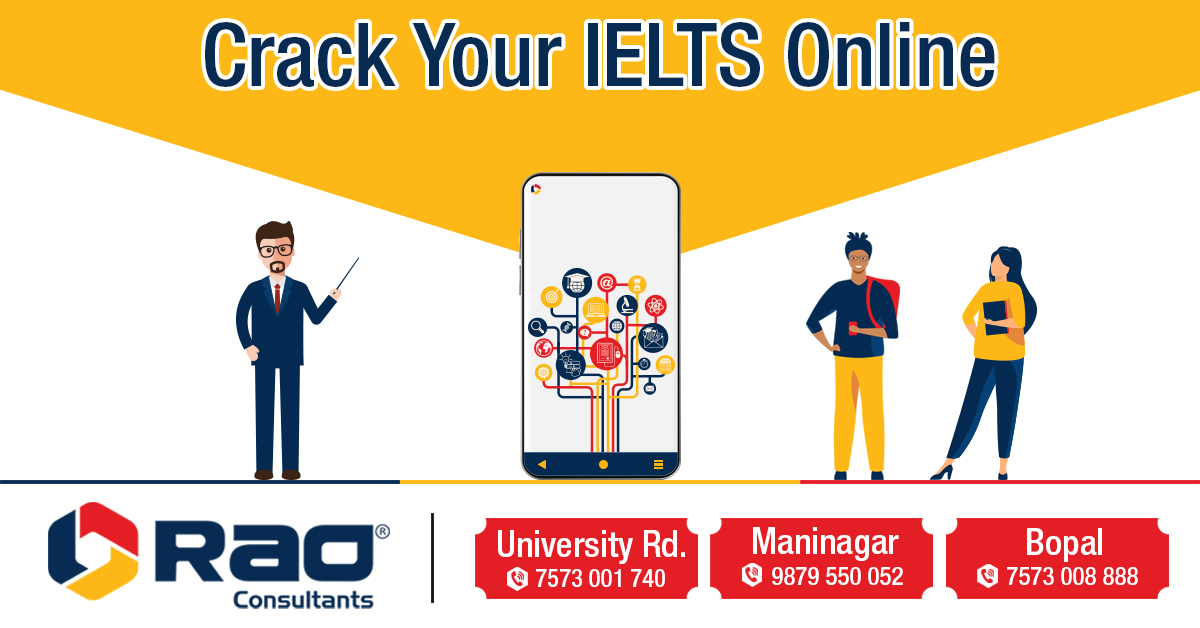![]()
Do you plan to study and settle abroad but afraid the language might pose an obstacle for you? Does your location is far from renowned IELTS coaching classes but still you want to attend? If your answer is yes to both the questions then we have some good news for you! No matter wherever you live, there is a way to master a language without going into a classroom – learning a language online. Online learning is also a brilliant way of learning while stuck in a pandemic situation as COVID 19. Let’s understand why should you join in online IELTS classes?
What is online IELTS Coaching?
Online education is an art of knowledge transfer through the internet, from anywhere in the world to targeted students to learn their specific subject. The online IELTS coaching not only provides you with the right resources and exercise to do well in your exams but also provides you opportunities to practice them under the direction of a trainer. Moreover, you will develop your speed reading skills, listening skills, improve your speaking responses, and your essay planning and writing skills.
More Benefits of Online Coaching:
- More Convenience: You can learn from anywhere around the world as long as you have an internet connection. Your coaches will connect with you through a video app or email.
- More Attention: Online IELTS education permits you to enjoy individual attention from your coach. They can evaluate your recorded video and guide further accordingly.
- More Stress-free: Online learning would relieve you of that hassle since you are working independently and not in a classroom.
- More Flexibility: In an online class, you have the flexibility to choose a schedule that is most suitable for you. You can opt to have just a few hours a day.
- More Comfort: IELTS learning solves the problem of finding IELTS classes in your locality. You don’t need to travel to your class and you can just study at home.
- More Easy on the Pockets: eBooks and notes are always saved in your hard drive when it comes to online training.
- More Support: You can interact with your mentors via email, whenever you have any doubts, and chat support is available on video lessons and websites.
- More Accessibility: Online education help professionals to learn better and faster, as downloadable online notes, online support, online interaction, training videos, and assessments are easily accessible.
- More Information Retention: Online coaching help learners hold and remember information with eye-catching images, relevant videos, legible fonts, movie clips, animated descriptions, etc.
- More Constructive: It’s providing constructive criticism through quizzes offer trainees the ability to understand where they stand in terms of knowledge.
- More Cost-effective: As transportation, parking, maintenance, etc. expenses not affecting in online classes, it’s more efficient.
- More Safety: You are safe and secure from the transition of hazardous viral disease as you are not directly in touch with anybody.
- More Time saving: Faster and frequent feedback saves your time and efforts when compared to other platforms of coaching.
Say No to Myths:
Myth 1: Online courses aren’t as actual as in-class learning
Fact: Over the years, numerous online courses have confirmed themselves to be just as effective as their traditional counterparts when it comes to learning.
Myth 2: Online courses aren’t recognized:
Fact: Since online education became more accepted, various accredited institutions have included online courses as part of their curriculum.
Myth 3: It’s easier to cheat in an online class:
Fact: Online cheating was a major concern for several years, but technology has changed to address this criticism. Online teaching also inclines to appraise students differently.
Myth 4: Online students don’t get to cooperate with the teacher:
Fact: Online education provides the opportunity for tutors to join in on discussion chat rooms, offer webinars, or even conduct video conversations as one to one with students who need more personal guidance.
Why IELTS is Very Important?
International English Language Testing System (IELTS) is the globally-recognized exam for the English language. The prime objective of IELTS is to measure the English language aptitude of the candidates who wish to study or settle abroad where English is the leading language of communication. Language skills are also the key factor to improve your study and career achievement abroad. The language score is even helpful to you when points are measured for your final visa selection.
Importance of IELTS in Abroad Education:
As an imminent international student or international citizen, you will need higher IELTS scores to be enrolled in an advanced degree program. See the minimum score of IELTS to secure admission in different countries.
|
Countries |
IELTS Minimum Requirement (UG) |
IELTS Minimum Requirement (PG) |
|
United States |
6 Bands | 6.5 Bands |
|
UK |
6 Bands |
6.5 Bands |
|
Canada |
6 Bands |
6.5 Bands |
|
Germany |
6 Bands | 6.5 Bands |
|
Australia |
6 Bands |
6.5 Bands |
*Disclaimer: The minimum IELTS requirement may differ upon college, course, and visa guidelines.
Hence, securing a higher score in IELTS assists you to obtain admission into international universities, institutes and eventually achieving your career dreams.
How IELTS Increases Your Chances for Visa Approval?
There are many factors affecting your points in the visa process, such as your Age, Education, Finance, family background, and many more. Among all these factors you can only increase your points by IELTS exam scores that are yet in your hand to improve. Since you can neither change your age, education, and other concerning factors.
How is the IELTS Score Measured?
There are two types of IELTS scores – Overall Band Scores and Sectional Band Scores. Sectional band scores are the scores obtained by a test-taker in per section, and the Overall Band Score is the average of all the sectional band scores. Test-takers are marked from 0 to 9 for both overall and sectional scores. Overall band scores are always rounded off to the next half or whole band.
|
IELTS Band Score Descriptors |
|
|
IELTS Band Score |
Skill Level |
|
9 |
Expert |
|
8 |
Very good |
|
7 |
Good |
|
6 |
Competent |
|
5 |
Modest |
| 4 |
Limited |
|
3 |
Extremely Limited |
|
2 |
Intermittent |
|
1 |
Did Not Attempt the Test |
Summary:
Your IELTS score plays a very important part of obtaining a visa, admission or settles in leading English-speaking countries. A high score can set you on a different level from other candidates and stretch your profile substantially. In recent years online coaching has been becoming very popular among the aspirants. Applying the online for improving your abilities is the crucial way to climb up the success ranking, as the best investment that you can make is investing in yourself.
Why Choose no.1 IELTS Coaching?
Rao Consultants, the No.1 IELTS Coaching class in Ahmedabad, provides you with online IELTS coaching, focused practice in combination with the precise training. Our experienced and specialized instructors, up-to-date techniques, and world-class material ensure that you not only prepare for the exam but also upturn mastery of the English language. Our words transform into actions and the final results are there for all to see.
See for yourself! Your career! Your dreams! Online IELTS exam!







